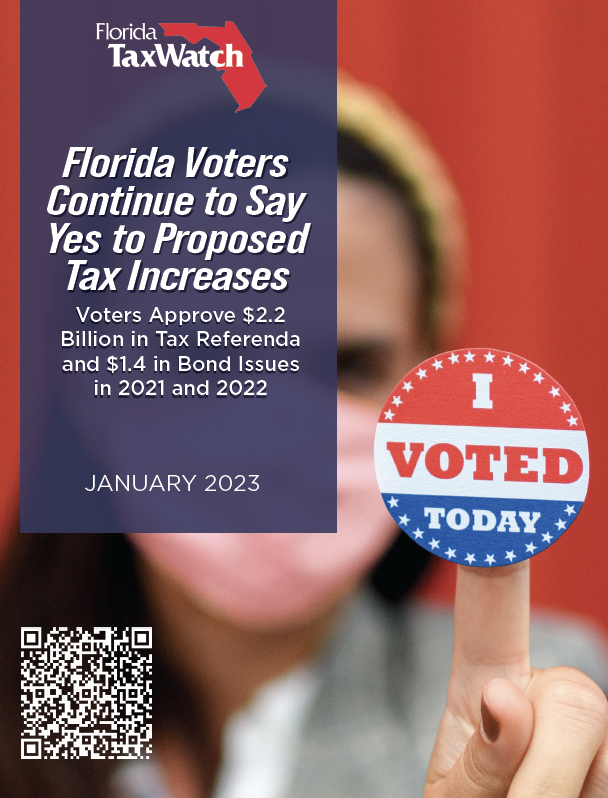Florida Voters Continue to Say Yes to Proposed Tax Increases
Voters approve $2.2 billion in tax referenda and $1.4 in bond issues in 2021 and 2022
*Click on the report cover to download the report.
 At the state level, taxpayers in Florida have enjoyed tax cuts passed by the Legislature every year since 2009. However, at the local level, Florida voters continue to vote to significantly increase the taxes they pay. A 2021 Florida TaxWatch report discovered that since 2010, Floridians voted to increase their own taxes 142 times. This includes voting to extend existing expiring tax levies.
At the state level, taxpayers in Florida have enjoyed tax cuts passed by the Legislature every year since 2009. However, at the local level, Florida voters continue to vote to significantly increase the taxes they pay. A 2021 Florida TaxWatch report discovered that since 2010, Floridians voted to increase their own taxes 142 times. This includes voting to extend existing expiring tax levies.
This trend has continued. In the 2021 and 2022 elections, voters in 29 Florida counties approved 35 county-wide sales and property tax increases worth $2.2 billion annually. In addition, voters approved 11 bond issues totaling $1.4 billion. This adds to the $4.8 billion in taxes and 69 bond issues worth $6.0 billion approved by voters between 2010 and 2020.
The elections in 2022 resulted in a record 31 approved tax referenda, totaling $2.2 billion. This surpassed the $2.1 billion in 28 referenda passed by voters in 2018. An additional four tax ballot measures, worth $97.4 million, were approved in 2021 (detailed in Appendix A).
The total could even have been much higher. Six of the 16 referenda proposing new or extended local options sales tax levies were defeated and some of the rejected measures were big ones. Voters in Orange and Hillsborough counties rejected new 1 penny sales taxes, totaling more than $1 billion between them. The Hillsborough proposal went down by a very close vote, with 49.9 percent in favor and 50.1 percent against. This was a difference of approximately only 11,000 votes out of the 245,000 cast.
Referenda proposing local option sales taxes and ad valorem (property tax) levies for schools are generally required by state law. Local governments also occasionally let the voters decide on property taxes for other issues, including conservation and environmental land purchases, children’s services, libraries, cultural and historical projects, and even mosquito control and animal services.
In addition, to these county-wide taxes, voters have approved 11 of 12 proposed bond issues worth $1.4 billion, providing revenue for large projects that will require increased taxes to pay off the debt. The amount of the levy (or even the revenue source) is not always specified in the ballot language, but most of these bonds will be retired with property taxes. These bonds will be issued by counties (5), municipalities (5), and one school district (detailed in Appendix B).
While not detailed in this report, there were also at least 15 revenue hikes for special districts on ballots. Fourteen of those passed. Most were non-ad valorem (special) assessments, but five were property tax increases. Two votes were decided by the slimmest of margins. An increase for the Hammock Woods Special District was approved by one vote (41-40) and after being voted down in 2021, an assessment for the Lake Magdalene Special District was approved by three votes (242-239) in 2022. These less-than-county-wide revenue increases are not included in this report’s totals, but they are listed in Appendix C.